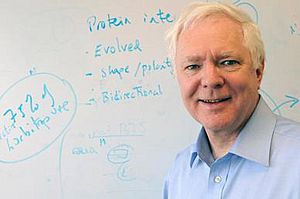Tony Pawson (biochemist) facts for kids
Quick facts for kids
Tony Pawson
|
|
|---|---|
 |
|
| Born |
Anthony James Pawson
18 October 1952 Maidstone, England
|
| Died | 7 August 2013 (aged 60) Toronto, Ontario
|
| Nationality | British-Canadian |
| Alma mater | Clare College, Cambridge King's College London (PhD) |
| Known for | Cellular signal transduction |
| Awards | Gairdner Foundation International Award (1994) Flavelle Medal (1998) Wolf Prize in Medicine (2005) Royal Medal (2005) Kyoto Prize (2008) Fellow of the Royal Society |
| Scientific career | |
| Fields | Genetics, microbiology |
| Institutions | University of Toronto Mount Sinai Hospital, Toronto Samuel Lunenfeld Research Institute |
| Thesis | Studies on the Proteins and Nucleic Acids of RNA Tumour Viruses (1976) |
Anthony James Pawson CH, OC, OOnt, FRS, FRSC (October 18, 1952 – August 7, 2013) was a brilliant scientist from Britain and Canada. His research completely changed how we understand how cells communicate. Imagine cells as tiny messengers in your body. They need to send and receive signals to know what to do. Dr. Pawson discovered a key part of this communication system.
He found special parts of proteins called "SH2 domains." These domains are like special connectors. They help proteins link up and pass messages inside cells. This discovery helped us learn a lot about how our bodies work. It also gave us clues about how diseases like cancer develop.
Contents
About Anthony Pawson
Early Life and Education
Anthony Pawson was born in Maidstone, England, on October 18, 1952. His father, Tony Pawson, was a sportsman and writer. His mother, Hilarie, was a botanist and high-school teacher. Anthony was the oldest of three children in his family.
He went to Winchester College for school. Later, he studied biochemistry at Clare College, Cambridge. He then earned his PhD from King's College London in 1976. After that, he did more research at the University of California, Berkeley until 1980.
His Scientific Career
From 1981 to 1985, Dr. Pawson worked as a professor at the University of British Columbia. In 1985, he moved to Toronto, Canada. There, he joined the Samuel Lunenfeld Research Institute at Mount Sinai Hospital. He also became a professor at the University of Toronto.
He was known as a Distinguished Investigator and was once the Director of Research at the Lunenfeld Institute. His work there focused on understanding how cells talk to each other. This is called "cellular signal transduction."
A Great Discovery: SH2 Domains
Dr. Pawson's most famous discovery was the SH2 domain. He found that these tiny parts of proteins are essential for cell communication. They act like special "docking stations" for other proteins. This allows messages to be sent quickly and correctly inside cells.
Think of it like a puzzle. The SH2 domain is a specific shape that only fits certain other protein pieces. When they connect, a signal is passed along. This discovery was a huge step forward in biology. It helped scientists understand many body processes. It also opened new ways to study diseases.
Later Life
Anthony Pawson passed away on August 7, 2013. He was 60 years old. His work continues to influence scientists around the world.
Awards and Recognition
Dr. Pawson received many important awards for his groundbreaking research. Here are some of them:
- 1994 Gairdner Foundation International Award
- 1994 He became a Fellow of the Royal Society of London and the Royal Society of Canada.
- 1998 He won the Heineken Prize for Biochemistry and Biophysics. This award is from the Royal Netherlands Academy of Arts and Sciences.
- 1998 He received The Royal Society of Canada Flavelle Medal. This was for his great achievements in biological science.
- 2004 He became an Associate of the National Academy of Sciences (US).
- 2005 He was awarded the Wolf Prize in Medicine. This was for finding protein parts that help cells signal each other. This research helped us understand cancer better.
- 2005 He received The Royal Medal (The Queen's Medal) from The Royal Society of London.
- 2006 He was made a Companion of Honour.
- 2008 He won the Kyoto Prize. This is sometimes called "Japan's Nobel." He received it for showing how "adapter molecules" help in cell signaling.
- 2012 He was named a Thomson Reuters Citation Laureates. This meant he was a strong candidate for the Nobel Prize in Medicine.
- 2013 The Canadian National Proteomics Network named their annual award after him. It is now called the CNPN-Tony Pawson Proteomics Award.

